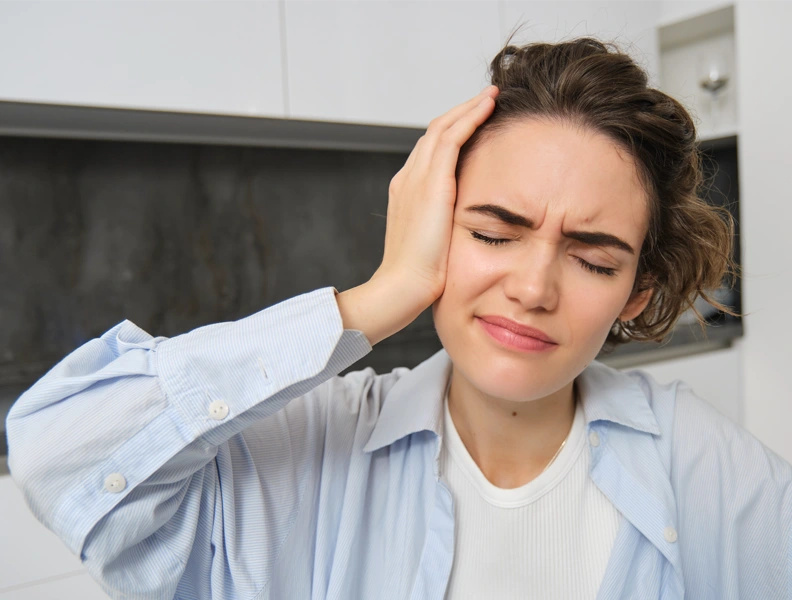What is Post-Concussion Syndrome?
Post-concussion syndrome (PCS) is a condition that can occur following a concussion, which is a mild traumatic brain injury (TBI). It occurs when symptoms from a concussion [link to the concussion symptoms] persist beyond the typical recovery period and for more than 3 months. While most individuals recover fully within this timeframe, those with PCS may experience symptoms lasting months or even years [1]. This condition can affect physical, emotional, and cognitive well-being, making it important to recognize and address the signs early.
PCS is not fully understood, but it likely results from brain changes after a concussion, chemical imbalances, persistent neuromuscular problems and psychological factors like stress.
For many, PCS is manageable with proper medical care, and most people see significant improvement over time. However, understanding your symptoms and seeking appropriate treatment is key to recovery.
Post-Concussion Syndrome Symptoms
Post-concussion syndrome symptoms vary widely among individuals and can be grouped into three main categories: physical, cognitive, and emotional/behavioral. These symptoms may appear immediately after a concussion or develop gradually over time. For some, the effects persist for weeks or even years, referred to as persistent post-concussion syndrome or post-concussion syndrome years later.
Physical Post-Concussion Syndrome Symptoms
Physical symptoms are often the most noticeable and disruptive, impacting daily life and overall well-being. Common physical symptoms include:
- Headaches: Often described as tension headaches or migraines, these are the most frequently reported symptoms.
- Dizziness and Vertigo: A common issue, particularly in the early stages.
- Sensitivity to Light and Noise: Bright lights and loud sounds may feel overwhelming, causing discomfort and worsening other symptoms.
- Sleep Disturbances: Insomnia or excessive sleepiness are common complaints, further exacerbating fatigue and irritability.
- Fatigue: Persistent exhaustion that does not improve with rest.
- Visual Disturbances: Blurred vision or difficulty focusing are often reported, especially when performing detailed tasks or using digital screens.
Cognitive Post-Concussion Syndrome Symptoms
Cognitive symptoms, often referred to as “mental fog” or “brain fog,” can interfere with work, study, and everyday activities. These symptoms include:
- Difficulty Concentrating: Many individuals report struggling to focus on tasks.
- Memory Problems: Short-term memory is commonly affected, leading to forgetfulness or difficulty retaining new information.
- Slower Thinking and Processing Speed: Tasks that once felt simple may take longer to complete.
- Decision-Making Challenges: Making choices, even minor ones, may become overwhelming due to impaired reasoning abilities.
Emotional and Behavioral Post-Concussion Syndrome Symptoms
Emotional symptoms often overlap with psychological responses to the condition, such as stress or frustration with slow recovery. Common emotional and behavioral symptoms include:
- Irritability: Increased sensitivity to minor annoyances or frustrations is frequently reported.
- Depression: Feelings of sadness, hopelessness, or disinterest in activities may develop, particularly as a long-term effect of concussion.
- Anxiety: Worrying about recovery, fear of re-injury, or general nervousness may intensify emotional distress.
- Mood Swings: Rapid changes in mood, from irritability to sadness.
Persistent Post-Concussion Syndrome Symptoms
In some cases, symptoms linger for years, significantly affecting quality of life. This is referred to as the long-term effects of concussion or post-concussion syndrome years later. Persistent symptoms can manifest in any of the categories mentioned above and may include chronic headaches, ongoing cognitive challenges, or prolonged emotional distress.
If symptoms persist for more than three months, it’s essential to seek specialized care. Persistent symptoms often require a multidisciplinary approach to treatment, including neurology, psychiatry, and neuromuscular therapy.
How Long Does It Take for Post-Concussion Syndrome to Go Away?
The duration varies. While many people recover within a few weeks, others may experience post-concussion syndrome symptoms for months or even years [1]. Timely medical care and adherence to treatment plans can accelerate recovery.
Does Post-Concussion Syndrome Ever Go Away?
For most individuals, post-concussion syndrome symptoms gradually resolve with proper treatment and self-care. However, persistent cases may require long-term management, particularly if symptoms last beyond a year.
When to Seek Medical Attention
It’s crucial to consult a healthcare professional if you experience severe or worsening symptoms, such as:
- Intense or unrelenting headaches
- Unexplained vision or balance issues
- Difficulty waking up
- Severe mood changes or confusion
These signs may indicate complications requiring immediate evaluation.
What Causes Post-Concussion Syndrome?
The exact cause of post-concussion syndrome (PCS) is not fully understood, but it is thought to result from a combination of physical, neurological, and psychological factors.
- Neurological Effects
A concussion can disrupt normal brain function, even if no visible damage appears on imaging tests. This disruption may interfere with neural communication and lead to persistent symptoms such as headaches, fatigue, and cognitive difficulties.
- Chemical and Functional Imbalances
Changes in the brain’s chemical environment after a concussion can affect its ability to regulate emotions, concentration, and sleep. These imbalances are believed to contribute to long-term issues like persistent post-concussion syndrome.
- Psychological Stress
The trauma of the injury and frustration during recovery can amplify symptoms, particularly in individuals prone to anxiety or depression. Stress often exacerbates fatigue, irritability, and cognitive challenges.
What Makes Post-Concussion Syndrome Worse?
Factors such as stress, lack of rest, overexertion, or untreated underlying conditions can worsen post-concussion syndrome symptoms. Returning to strenuous activities too soon or neglecting proper medical care may also prolong recovery.
Risk Factors for PCS Syndrome
Several factors increase the likelihood of developing post-concussion syndrome:
- Severe or Multiple Head Injuries: Repeated trauma makes the brain more vulnerable to prolonged symptoms.
- Age (Older Adults): Slower recovery rates in older individuals increase the risk of persistent post-concussion syndrome.
- Pre-Existing Mental Health Conditions: Anxiety, depression, or PTSD can amplify symptoms and delay recovery.
- History of Migraines or Neurological Issues: These conditions heighten sensitivity to brain disruptions, worsening post-concussion syndrome symptoms.
Prevention of Post-Concussion Syndrome
While preventing post-concussion syndrome entirely may not always be possible, these steps can reduce the risk:
- Wear Protective Headgear: Proper gear during sports or high-risk activities minimizes the chance of a concussion.
- Avoid High-Risk Activities: Limiting exposure to situations with a high likelihood of head injury can help prevent PCS.
- Seek Prompt Treatment: Early evaluation and care for concussions reduce the likelihood of developing persistent post-concussion syndrome.
Taking these precautions can support safer recovery and lower the risk of long-term symptoms.
Living with Post-Concussion Syndrome
The presence of symptoms can make living with post-concussion syndrome incredibly challenging. Simple tasks may feel daunting, and the cumulative effects of physical, cognitive, and emotional symptoms often create a cycle of stress and frustration. With proper medical care and coping strategies, however, individuals can significantly improve their quality of life and gradually return to normal activities.
For those living with post-concussion syndrome, managing symptoms requires a combination of medical treatment, lifestyle changes, and coping strategies. This may include:
- Cognitive behavioral therapy for emotional symptoms
- Neuromuscular therapy for balance issues
- Medications for headaches or sleep problems
If you or someone you know is struggling with post-concussion syndrome symptoms, consult a specialist at Moore MyoWorx. The MyoWorx Accelerated Recovery Program (ARP) outcomes show that 89% of patients improve following just 2 weeks of this intensive treatment program. Also, the results show that all three categories of post-concussion symptoms can be alleviated. Early intervention can make a significant difference in managing symptoms and improving quality of life.
References
- Mayo Clinic: “Persistent post-concussive symptoms (Post-concussion syndrome)”.




